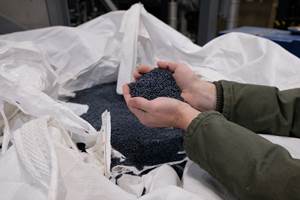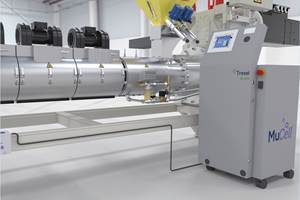Recycling Challenges Become Opportunities with the Aid of New Technologies
The latest recycling equipment on view at the K Show handles more materials, is more efficient and produces higher quality output than ever achieved before.
Germany is widely acknowledged as the world leader in plastics recycling, so it will come as no surprise that recycling is a prominent theme at next month’s K 2022 show in Düsseldorf.
Of course recycling is also a major global concern, and the K Show is an international showcase of new technology. Governments and corporations are setting ambitious goals for plastic products and packaging recycling rates, which will require more and better recycling equipment to meet the necessary throughput. Many exhibitors serving recyclers see this challenge as an opportunity. Suppliers plan to demonstrate how their latest equipment handles more materials, is more efficient and produces higher quality output than ever achieved before.
All steps in the recycling chain will be on display. For those walking the mammoth show, it adds up to a tour of various recycling loops, from collected waste to new manufactured products. Visitors will see the continuing evolution of industrial recycling, as processes are combined, streamlined, and updated with new technologies.
Recyclate Preparation
Next Generation Recycling will offer a live demonstration of its Nxt:Gran system, which incorporates several steps—shredding, feeding and extruding—into a single operation. Overall output has been increased by improving the cutting efficiency of the shredder and optimizing material feeding. Next Generation will also highlight its P:React machine, which uses liquid-state polycondensation to remove contaminants from PET, allowing production of 100% food-grade rPET.
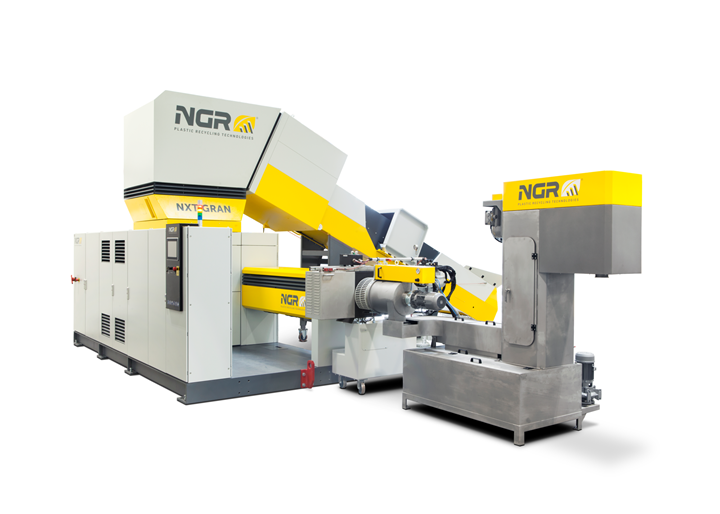
The NXT:Gran system incorporates shredding, feeding, and extruding. (Photo: Next Generation Recycling)
Saperatec will be highlighting its recently announced hot-wash separation technology for composite multilayer packaging. The process adds no contaminants to recycled polymers, and all chemicals used in the process comply with EU food-contact regulations, helping to ensure the outputs are suitable to replace virgin raw materials in film and foil-based packaging.
Innovations will be exhibited in every step of the process chain, from grinding, washing, drying, compounding and repelletizing to injection molding.
Lindner will be presenting the upgraded Jupiter BW shredder for the first time. Its newly developed cutter system produces a homogenous particle size with fewer fines and also optimizes particle size for near-infrared (NIR) sorting.
Lindner will also exhibit innovations in washing and drying. Its Rafter prewash system includes a larger rotor that lengthens dwell times. Ecodry is a new thermal dryer boasting energy savings of up to 30%, achieved by strategic use of heat exchangers and insulation.
Hosokawa Alpine will present its new Polyplex PPC 50/120 Combi Grinder. The rotor is arranged vertically, with an upper shredding zone and a granulator zone below. The joint drive reportedly makes size reduction more energy efficient. The firm will also present the Polymer-Line PL-XS 45/100, a compact granulator for economical size reduction of bulky plastics.
Herbold Meckesheim will have its HV series Plastcompactor, which is used for agglomeration of recovered materials, as well as drying, recrystallization and compounding. Pre-granulated material is screw-fed into the processing area, between a fixed disk and a rotating disk, where it is rapidly heated by friction. Both disks are equipped with replaceable kneading rails.
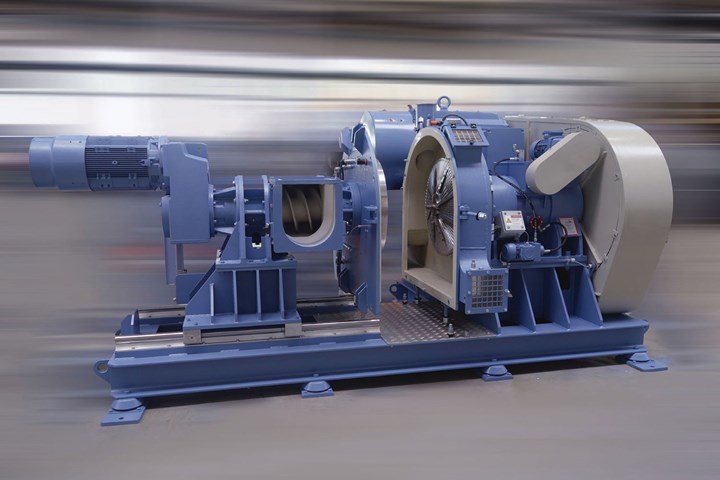
The HV Plastcompactor for agglomeration, drying, recrystallization, and compounding. (Photo: Herbold)
Herbold will also display the SML 60/100 Sb, a granulator for PET bottles. Material is fed by three vertical screws, a unique setup that reportedly offers consistent feed rates, reduced power consumption, no material flyback, quieter operation, reduced wear on the cutting chamber, and reduced fines and dust when compared with gravity feed.
Herbold’s 216 T Series is an intensive washer that can also be used as a dryer. For washing flakes, it features a special high-speed rotating agitator, a stainless-steel screen basket, and double outboard bearings.
Sorema will be highlighting its recycling process for PET bottles, which transforms collected consumer waste into clean, dried PET flakes. The washing process water moves in the opposite direction of material flow, such that the final rinse is completed by the cleanest water, which is then reused in upstream cleaning phases. Capacities range from 1320 to 20,000 lb/hr (600 to 9000 kg/hr).
Recycling in Extrusion, Compounding, Molding
The open-air fairground at K Show will be dedicated to a Circular Economy Forum, allowing live demonstrations of product recycling. As an example of an entire washing plant, Lindner will present a shredding, washing and drying unit with integrated water treatment and will demonstrate recycling live several times each day. Rigid plastics will pass through the Micromat HP shredding machine, a new series featuring bolted knives and an enhanced drive, which can handle either film or rigid plastics. The demonstration will continue with the clean and homogeneous flakes being directly molded into new product, without need for extrusion.
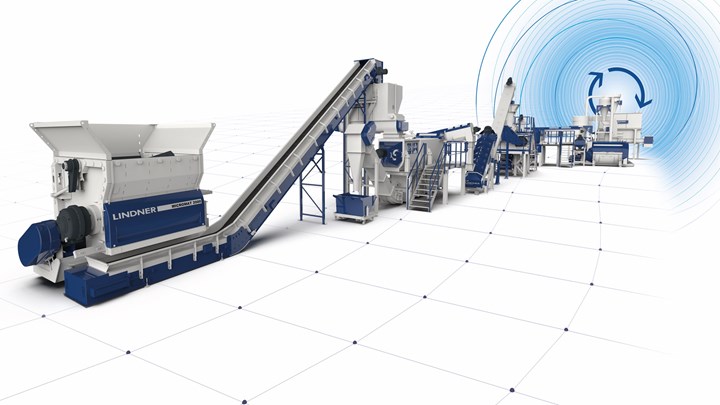
Lindner’s integrated recycling system with shredding, washing, and drying.
(Photo: Lindner)
Recycling will be a theme in injection molding as well. Arburg will demonstrate production of plastic plugs from recyclate on its electric Allrounder 370 A injection molding system with Multilift robot. At Arburg’s main booth, other injection machines will also demonstrate the capabilities of its recyclate processing package. An Allrounder 470 A will mold PP handles from PCR; an Allrounder 270 S will produce tweezers from glass-reinforced PPS recyclate; and an Allrounder 375 V will produce a bicycle tool from recycled nylon.
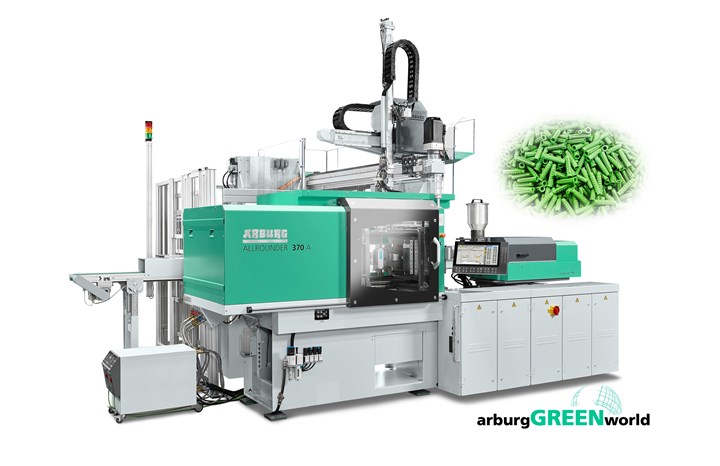
Arburg Allrounder 370 A will be producing plastic plugs (inset) from recyclate.
(Photo: Arburg)
Erema will highlight its new, larger and more efficient Vacurema recycling extruder, which promises a broader processing window and gentler material treatment. It has a capacity of 13,200 lb/hr and uses 10% less energy than previous equipment. Erema’s latest extrusion filter, the Laserfilter 406 features 50% more filtering area and increased throughput.
Erema will also present its data solutions for process monitoring and equipment maintenance. PredictOn is its system of software and instrumentation for early detection of critical component failure, and Bluport is a suite of apps for machine performance monitoring. (More details in last month’s Keeping Up section.)
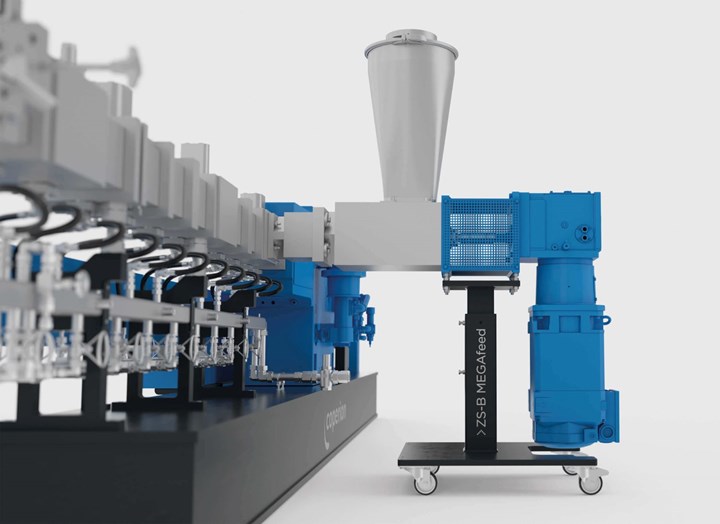
Coperion’s ZSB Megafeed side system allows feeding of low-density recyclate.
(Photo: Coperion)
Coperion will be exhibiting an entire production line for PET recycling. The exhibit will encompass bulk solids handling, feeding, extruding and pelletizing. At the center will be a system built around a ZSK 58 MC18 twin -screw extruder, configured for manufacturing high-quality PET using recycled materials, without the necessity for predrying and crystallization. The extruder will be fed by the SWB-300 belt feeders, an S100 single-screw pre-feeder, and a new ZSB 70 Megafeed side feeder, which can reliably feed large quantities of plastic recyclate with densities as low as 12.5 lb/ft3. After melting, devolatilization, and homogenization in the extruder, the material stream is filtered and transferred to an underwater pelletizer. The pellets are then condensed in a solid state polycondensation reaction, then are ready to be reprocessed into bottles, fibers, or films. The output of this process has been approved by the FDA for direct food contact (letter of non-objection).
KraussMaffei will demonstrate compounding of three different materials in its direct-compounding injection molding (DCIM) process: PP fiber from face masks, shredded HDPE from packaging, and HDPE blow molding scraps from toy production. The combination of molding and compounding in a single heating process reduces material cost by up to 50%. DCIM uses a single-screw extruder on the injection machine, which is more economical than KM’s IMC process using a twin-screw compounder on the injection press. At the K show the direct compounding process will be used to make collapsible crates for transporting fresh fish.
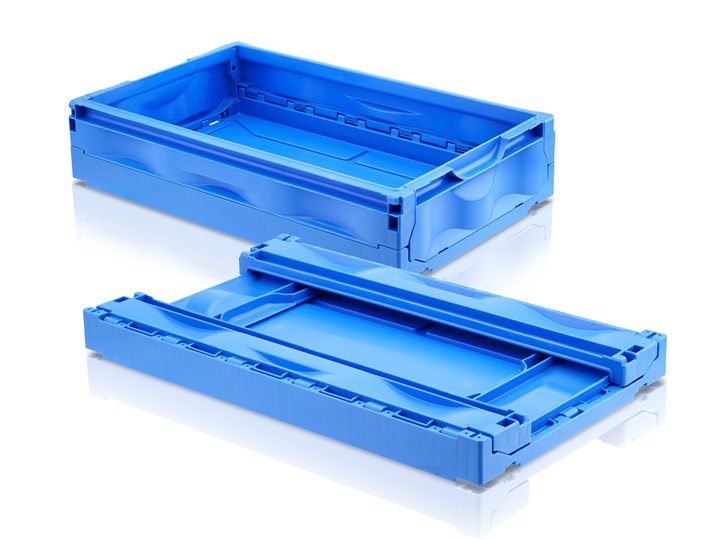
Collapsible crate made from direct-compounding injection molding of recycled PP or HDPE.
(Photo: KraussMaffei)
Aisa Automation of Switzerland will present the IPRA 250 recycling plant, which processes mixed, multi-component plastics into new, simple recycled products without any chemical separation, washing, or granulation.
Chemical Recycling
Several exhibitors will be presenting solutions for new directions in the area of chemical recycling, sometimes called advanced recycling, with the potential to process plastic waste into monomer feedstock. Coperion will highlight equipment capabilities that support chemical recycling of mixed waste, especially packaging waste, which include the K-Tron feeder for accurate loading of raw materials and the ZSK twin-screw extruder for preparing material for chemical recycling reactors.
Erema will be presenting its entry into chemical recycling, Chemerema. Its extrusion process is specifically tuned for downstream input to chemical recycling processes.
California startup Novoloop will present its Oistre product, a PU made from recycled PE. Novoloop says its process is a simpler, cheaper and lower-carbon alternative to pyrolysis.
Rittec of Germany will present its revolPET technology for breaking down PET from mixed plastic waste to monomer material. Rittec has now adapted this technology to polyester material, opening up the possibility of recycling textiles.
Related Content
Extrusion Technology Extended to Injection, Enabling Up to 100% Regrind Usage
Twin-barrel (shot-pot) press can handle more regrind, offers other benefits to molders.
Read MoreNew Facility Refreshes Post-Consumer PP by Washing Out Additives, Contaminants
PureCycle prepares to scale up its novel solvent recycling approach as new facility nears completion.
Read MoreFoam-Core Multilayer Blow Molding: How It’s Done
Learn here how to take advantage of new lightweighting and recycle utilization opportunities in consumer packaging, thanks to a collaboration of leaders in microcellular foaming and multilayer head design.
Read MoreNPE2024 Wrap-Up: Sustainability Dominates Show Floor News
Across all process types, sustainability was a big theme at NPE2024. But there was plenty to see in automation and artificial intelligence as well.
Read MoreRead Next
See Recyclers Close the Loop on Trade Show Production Scrap at NPE2024
A collaboration between show organizer PLASTICS, recycler CPR and size reduction experts WEIMA and Conair recovered and recycled all production scrap at NPE2024.
Read MorePeople 4.0 – How to Get Buy-In from Your Staff for Industry 4.0 Systems
Implementing a production monitoring system as the foundation of a ‘smart factory’ is about integrating people with new technology as much as it is about integrating machines and computers. Here are tips from a company that has gone through the process.
Read MoreMaking the Circular Economy a Reality
Driven by brand owner demands and new worldwide legislation, the entire supply chain is working toward the shift to circularity, with some evidence the circular economy has already begun.
Read More
















